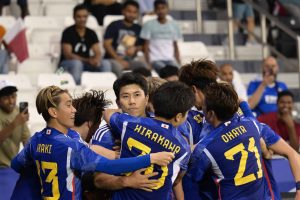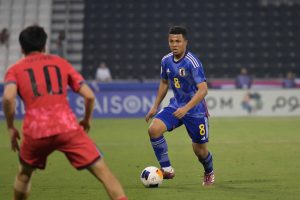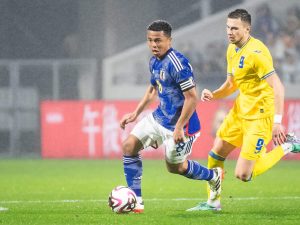
Japan qualified for the Olympics after defeating Iraq / photograph: Masahiro Ura
U-23 Asian Cup Review #5: Japan qualify for eighth consecutive Olympic Games after best performance earns them comprehensive win over Iraq
Japan secured their eighth consecutive Olympics berth with a decisive 2-0 win over Iraq in the semi-finals of the AFC U-23 Asian Cup, thanks to goals from Mao Hosoya and Ryotaro Araki.
Japan made two changes to their starting line-up from the quarter-final against Qatar, with the 11 starters all having earned the trust of their manager throughout the tournament.
Against a defensive Iraq, who set up with a back five, Japan dominated possession from the outset, and in the 10th minute Hosoya went close with a left-footed effort after crisp passes forward from Joel Chima Fujita and Araki. That warning shot, reminiscent of the combination for the decisive goal against Qatar, signaled Japan’s intentions, and joy was soon to follow in the 28th minute.
A feed from Fujita played Hosoya in behind the opposition, and after some sharp control, he turned deftly, evaded a defender and slotted home with his right foot.
Japan’s rapidly-improving star striker had given them the lead for the second game in a row, and Araki added another in the 42nd minute after another direct pass from Fujita.
Even with a two-goal lead at the start of the second half, Japan continued to attack. In the 48th minute, Kuryu Matsuki fired in a left-footed shot, and soon after Ayumu Ohata’s cross from the left was met by Fuki Yamada with a neat flick. In the 65th minute, Fujita dribbled up the left flank on the counter and Hosoya met the resultant cross from Yu Hirakawa to threaten again with a header.
None of these attempts found the net, but the Japanese attack was smart and kept Iraq pushed back in their own half.
However, from around the 70th minute Iraq started to apply pressure of their own with long balls forward, and in the 74th minute a break down the Iraqi right produced a big chance inside the penalty area. Kota Takai used all his strength to make a heroic block though, and was able to divert the ball behind.
In the final stages of the game, Iraq started to fatigue, while Japan moved the ball around to run down the clock while also looking to strike again where possible.
At the very end, centre-back Ryuya Nishio was sent on in place of left-back Ohata to help contain the Iraqi attack. Although Japan failed to add to their tally, the score remained 2-0 and they emerged victorious.
The young Japanese side, who overwhelmed Iraq both offensively and defensively, can be said to have produced their best performance of the tournament in a match that brought with it huge pressure.
Captain Fujita thinks team has become stronger and can get stronger still
Before the tournament, it was predicted that Japan would struggle. This was partly due to the fact that they were drawn in the same group as arch-rivals South Korea, and partly because they were unable to call up European players such as Yuito Suzuki, who helps form the backbone of the team.
And indeed, the team did suffer at times early on in the tournament. After a narrow 1-0 win against China in their first match, in which Nishio was sent off, they showed a lack of decisiveness in the following game against the UAE, even though they won 2-0. In the third match against South Korea, which would decide who finished top of the group, Japan sank to a sucker blow from a set-piece and lost 1-0, meaning they failed to avoid a quarter-final clash with host nation Qatar.
In that game they had a numerical advantage after a Qatar red card, but were outplayed at times and the match required extra time.
However, they clearly gained confidence from that hard-fought victory.
At centre-back, where the most experienced player, Nishio, was suspended for three games due to his sending off against China, Seiji Kimura and 19-year-old Takai showed steady performances. At full-back, Hiroki Sekine and Ohata, both inexperienced in this team, seized regular places. Matsuki, Rihito Yamamoto and Sota Kawasaki showed their promise in a midfield led by Fujita, while Araki, who was called up for the first time in many years, shone throughout the tournament.
Up front, meanwhile, Hosoya and Kein Sato, previously the team’s leading scorers, had some tough times, but Hirakawa impressed and Shota Fujio and Yamada also made their presence felt. Then in the knockout stages, where losing was not an option, the team’s ace Hosoyadelivered when it mattered most.
“I think this team has become stronger, and I think we can get stronger still,” captain Fujita proudly stated. “I want to play a central role in raising that level even higher.”
The young Japanese team undoubtedly grew in stature as the tournament wore on.
With this victory, Japan’s objective of qualifying for the Olympics was achieved, but a final against Uzbekistan awaits them on 3 May. Will they travel to Paris having seized the Asian title? Japan’s battle is far from over.


